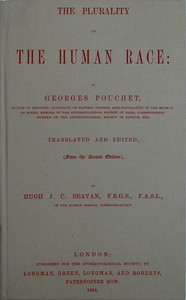| Author |
Pouchet, G. (Georges), 1833-1894 |
| Translator |
Beavan, Hugh J. C. |
| Title |
The plurality of the human race
|
| Original Publication |
United Kingdom: Longman Green Longman and Roberts, 1864.
|
| Credits |
deaurider, Krista Zaleski, and the Online Distributed Proofreading Team at https://www.pgdp.net (This file was produced from images generously made available by The Internet Archive)
|
| Summary |
"The Plurality of the Human Race" by Georges Pouchet is a scientific publication written in the mid-19th century. This work delves into the complex question of human origins and the classification of different human races, challenging traditional views and examining anthropological theories through a scientific lens. The book sets the stage for exploring various aspects of humanity, from physical and psychological characteristics to cultural and evolutionary considerations, addressing the intricate relationship between man and other primates. The opening of the book introduces the author's perspective on the struggle between scientific inquiry and established religious beliefs concerning the unity or plurality of the human race. Pouchet outlines the historical context of how anthropology has been influenced by religious texts, emphasizing the need for a scientific approach that prioritizes facts and reason over dogma. The text also presents a clear distinction between monogenist and polygenist theories of human origin, illustrating how differing views on humanity's beginnings have significant implications for the scientific study of human diversity. Overall, the early chapters of the book establish a critical foundation for exploring the complex nature of humanity within an anthropological framework. (This is an automatically generated summary.)
|
| Language |
English |
| LoC Class |
GN: Geography, Anthropology, Recreation: Anthropology
|
| Subject |
Monogenism and polygenism
|
| Category |
Text |
| EBook-No. |
70009 |
| Release Date |
Feb 10, 2023 |
| Copyright Status |
Public domain in the USA. |
| Downloads |
65 downloads in the last 30 days. |
|
Project Gutenberg eBooks are always free!
|

